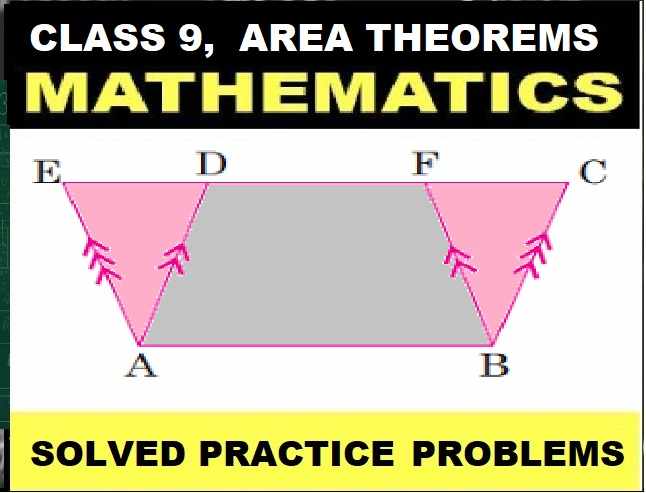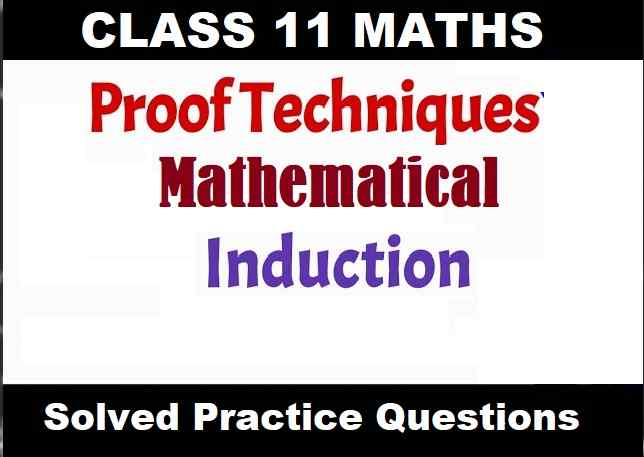ML Aggarwal Factorisation Exe-4.4 Class 9 ICSE Maths Solutions . Step by step solutions of Factorisation problems as council prescribe guideline. Visit official website CISCE for detail information about ICSE Board Class-9.
ML Aggarwal Factorisation Exe-4.4 Class 9 ICSE Maths Solutions
| Board | ICSE |
| Subject | Maths |
| Class | 9th |
| Chapter-4 | Factorisation |
| Topics | Solution of Exe-4.4 Questions |
| Academic Session | 2024-2025 |
Solution of Exe-4.4 Questions
ML Aggarwal Factorisation Exe-4.4 Class 9 ICSE Maths Solutions
Question 1.
(i) x2 + 5x + 6
(ii) x2 – 8x + 7
Answer :
(i) x2 + 5x + 6
x2 + 3x + 2x + 6
Take out common in all terms we get,
x(x + 3) + 2 (x + 3)
(x + 3) (x + 2)
(ii) x2 – 8x + 7
x2 – 8x + 7
x2 – 7x – x + 7
Take out common in all terms we get,
x(x – 7) – 1(x – 7)
(x – 7) (x – 1)
Question 2.
(i) x2 + 6x – 7
(ii) y2 + 7y – 18
Answer :
(i) x2 + 6x – 7
x2 + 7x – x – 7
Take out common in all terms we get,
x(x + 7) – 1(x + 7)
(x + 7) (x – 1)
(ii) y2 + 7y – 18
y2 + 7y – 18
y2 + 9y – 2y – 18
Take out common in all terms we get,
y(y + 9) – 2(y + 9)
(y + 9) (y – 2)
Question 3.
(i) y2 – 7y – 18
(ii) a2 – 3a – 54
Answer :
(i) y2 – 7y – 18
y2 + 2y – 9y – 18
Take out common in all terms we get,
y(y + 2) – 9(y + 2)
(y + 2) (y – 9)
(ii) a2 – 3a – 54
a2 – 3a – 54
a2 + 6a – 9a – 54
Take out common in all terms we get,
a(a + 6) – 9(a + 6)
So, (a + 6) (a – 9)
Question 4.
(i) 2x2 – 7x + 6
(ii) 6x2 + 13x – 5
Answer :
(i) 2x2 – 7x + 6
2x2 – 4x – 3x + 6
Take out common in all terms we get,
2x(x – 2) – 3(x – 2)
(x – 2) (2x – 3)
(ii) 6x2 + 13x – 5
6x2 + 13x – 5
6x2 + 15x – 2x – 5
Take out common in all terms we get,
3x(2x + 5) – 1(2x + 5)
(2x + 5) (3x – 1)
Question 5.
(i) 6x2 + 11x – 10
(ii) 6x2 – 7x – 3
Answer :
(i) 6x2 + 11x – 10
6x2 + 15x – 4x – 10
Take out common in all terms we get,
3x(2x + 5) – 2(2x + 5)
(2x + 5) (3x – 2)
(ii) 6x2 – 7x – 3
6x2 – 7x – 3
6x2 – 9x + 2x – 3
Take out common in all terms we get,
3x(2x – 3) + 1(2x – 3)
(2x – 3) (3x + 1)
Question 6.
(i) 2x2 – x – 6
(ii) 1 – 18y – 63y2
Answer :
(i) 2x2 – x – 6
2x2 – 4x + 3x – 6
Take out common in all terms we get,
2x(x – 2) + 3(x – 2)
(x – 2) (2x + 3)
(ii) 1 – 18y – 63y2
1 – 18y – 63y2
1 – 21y + 3y – 63y2
Take out common in all terms we get,
1(1 – 21y) + 3y(1 – 21y)
(1 – 21y) (1 + 3y)
Question 7.
(i) 2y2 + y – 45
(ii) 5 – 4x – 12x2
Answer :
(i) 2y2 + y – 45
2y2 + 10y – 9y – 45
Take out common in all terms we get,
2y (y + 5) – 9(y + 5)
(y + 5) (2y – 9)
(ii) 5 – 4x – 12x2
5 – 4x – 12x2
5 – 10x + 6x – 12x2
Take out common in all terms we get,
5(1 – 2x) + 6x(1 – 2x)
(1 – 2x) (5 + 6x)
Question 8.
(i) x(12x + 7) – 10
(ii) (4 – x)2 – 2x
Answer :
(i) x(12x + 7) – 10
Above terms can be written as,
12x2 + 7x – 10
12x2 + 15x – 8x – 10
Take out common in all terms we get,
3x(4x + 5) – 2(4x + 5)
(4x + 5) (3x – 2)
(ii) (4 – x)2 – 2x
(4 – x)2 – 2x
We know that, (a – b)2 = a2 – 2ab + b2
So, (42 – (2 × 4 × x) + x2) – 2x
16 – 8x + x2 – 2x
x2 – 10x + 16
x2 – 8x – 2x + 16
Take out common in all terms we get,
x(x – 8) – 2(x – 8)
(x – 8) (x -2)
Question 9.
(i) 60x2 – 70x – 30
(ii) x2 – 6xy – 7y2
Answer :
(i) 60x2 – 70x – 30
Take out common in all terms we get,
10(6x2 – 7x – 3)
10(6x2 – 9x + 2x – 3)
Again, take out common in all terms we get,
10(3x(2x – 3) + 1(2x – 3))
10(2x – 3) (3x + 1)
(ii) x2 – 6xy – 7y2
x2 – 6xy – 7y2
x2 – 7xy + xy – 7y2
Take out common in all terms we get,
x(x – 7y) + y(x – 7y)
(x – 7y) (x + y)
Question 10.
(i) 2x2 + 13xy – 24y2
(ii) 6x2 – 5xy – 6y2
Answer :
(i) 2x2 + 13xy – 24y2
2x2 + 16xy – 3xy – 24y2
Take out common in all terms we get,
2x(x + 8y) – 3y(x + 8y)
(x + 8y) (2x – 3y)
(ii) 6x2 – 5xy – 6y2
6x2 – 5xy – 6y2
6x2 – 9xy + 4xy – 6y2
Take out common in all terms we get,
3x(2x – 3y) + 2y (2x – 3y)
(2x – 3y) (3x + 2y)
Question 11.
(i) 5x2 + 17xy – 12y2
(ii) x2y2 – 8xy – 48
Answer :
(i) 5x2 + 17xy – 12y2
5x2 + 20xy – 3xy – 12y2
Take out common in all terms we get,
5x(x + 4y) – 3y(x + 4y)
(x + 4y) (5x – 3y)
(ii) x2y2 – 8xy – 48
x2y2 – 8xy – 48
x2y2 – 12xy + 4xy – 48
Take out common in all terms we get,
xy(xy – 12) + 4(xy – 12)
(xy – 12) (xy + 4)
Question 12.
(i) 2a2b2 – 7ab – 30
(ii) a(2a – b) – b2
Answer :
(i) 2a2b2 – 7ab – 30
2a2b2 – 12ab + 5ab – 30
Take out common in all terms we get,
2ab(ab – 6) + 5 (ab – 6)
(ab – 6) (2ab + 5)
(ii) a(2a – b) – b2
a(2a – b) – b2
Above terms can be written as,
2a2 – ab – b2
2a2 – 2ab + ab – b2
Take out common in all terms we get,
2a(a – b) + b(a – b)
(a – b) (2a + b)
Question 13.
(i) (x – y)2 – 6(x – y) + 5
(ii) (2x – y)2 – 11(2x – y) + 28
Answer :
(i) (x – y)2 – 6(x – y) + 5
Above terms can be written as,
(x – y)2 – 5(x – y) – (x – y) + 5
(x – y) (x – y – 5) – 1(x – y – 5)
Then,
(x – y – 5) (x – y – 1)
(ii) (2x – y)2 – 11(2x – y) + 28
(2x – y)2 – 11(2x – y) + 28
Above terms can be written as,
(2x – y)2 – 7(2x – y) – 4(2x – y) + 28
(2x – y) (2x – y – 7) – 4(2x – y – 7)
(2x – y – 7) (2x – y – 4)
Question 14.
(i) 4(a – 1)2 – 4(a – 1) – 3
(ii) 1 – 2a – 2b – 3(a + b)2
Answer :
(i) 4(a – 1)2 – 4(a – 1) – 3
Above terms can be written as,
4(a – 1)2 – 6(a – 1) + 2(a – 1) – 3
Take out common in all terms we get,
2(a – 1) [2(a – 1) – 3] + 1[2(a – 1) – 3]
(2(a – 1) – 3) (2(a – 1) + 1)
(2a – 2 – 3) (2a – 2 + 1)
(2a – 5) (2a – 1)
(ii) 1 – 2a – 2b – 3(a + b)2
1 – 2a – 2b – 3(a + b)2
Above terms can be written as,
1 – 2(a + b) – 3(a + b)2
1 – 3(a + b) + (a + b) – 3(a + b)2
Take out common in all terms we get,
1(1 – 3(a + b)) + (a + b) (1 – (a + b))
(1 – 3(a + b)) (1 + (a + b))
(1 – 3a + 3b) (1 + a + b)
Question 15.
(i) 3 – 5a – 5b – 12(a + b)2
(ii) a4 – 11a2 + 10
Answer :
(i) 3 – 5a – 5b – 12(a + b)2
Above terms can be written as,
3 – 5(a + b) – 12(a + b)2
3 – 9(a + b) + 4(a + b) – 12(a + b)2
Take out common in all terms we get,
3(1 – 3(a + b)) + 4(a + b) (1 – 3(a + b))
(1 – 3(a + b)) (3 + 4(a + b))
(1 – 3a – 3b) (3 + 4a + 4b)
(ii) a4 – 11a2 + 10
a4 – 11a2 + 10
Above terms can be written as,
a4 – 10a2 – a2 + 10
Take out common in all terms we get,
a2 (a2 – 10) – 1(a2 – 10)
(a2 – 10) (a2 – 1)
Question 16.
(i) (x + 4)2 – 5xy -20y – 6y2
(ii) (x2 – 2x2) – 23(x2 – 2x) + 120
Answer :
(i) (x + 4)2 – 5xy -20y – 6y2
Above terms can be written as,
(x + 4)2 – 5y(x + 4) – 6y2
(x + 4)2 – 6y(x + 4) + y(x + 4) – 6y2
Take out common in all terms we get,
(x + 4) (x + 4 – 6y) + y(x + 4 – 6y)
(x – 6y + 4) (x + 4 + y)
(ii) (x2 – 2x2) – 23(x2 – 2x) + 120
(x2 – 2x2) – 23(x2 – 2x) + 120
Above terms can be written as,
(x2 – 2x)2 – 15(x2 – 2x) – 8(x2 – 2x) + 120
Take out common in all terms we get,
(x2 – 2x) (x2 – 2x – 15) – 8(x2 – 2x – 15)
(x2 – 2x – 15) (x2 – 2x – 8)
Question 17. 4(2a – 3)2 – 3(2a – 3) (a – 1) – 7 (a – 1)2
Answer :
4(2a – 3)2 – 3(2a – 3) (a – 1) – 7 (a – 1)2
Let us assume, 2a – 3 = p and a – 1 = q
So, 4p2 – 3pq – 7q2
Then, 4p2 – 7pq + 4pq – 7q2
Take out common in all terms we get,
P(4p – 7q) + q(4p – 7q)
(4p – 7q) (p + q)
Now, substitute the value of p and q we get,
(4(2a – 3) – 7(a – 1)) (2a – 3 + a – 1)
(8a – 12 – 7a + 7) (3a – 4)
(a – 5) (3a – 4)
Question 18. (2x2 + 5x) (2x2 + 5x – 19) + 84
Answer :
(2x2 + 5x) (2x2 + 5x – 19) + 84
Let us assume, 2x2 + 5x = p
So, (p) (p – 19) + 84
p2 – 19p + 84
p2 – 12p – 7p + 84
p(p – 12) – 7(p – 12)
(p – 12) (p – 7)
Now, substitute the value of p we get,
(2x2 + 5x – 12) (2x2 + 5x – 7)
— : End of ML Aggarwal Factorisation Exe-4.4 Class 9 ICSE Maths Solutions :–
Return to :- ML Aggarawal Maths Solutions for ICSE Class-9
Thanks
Please Share with Your Friends


